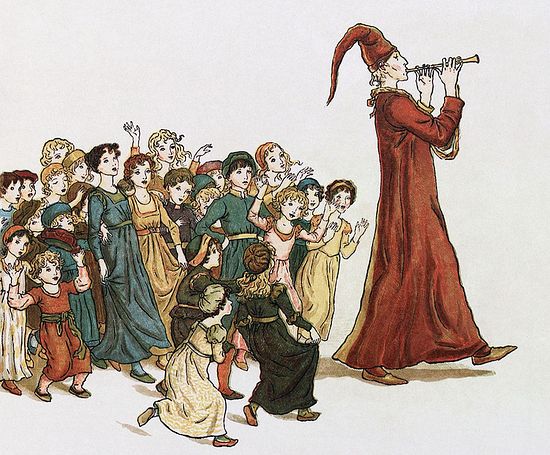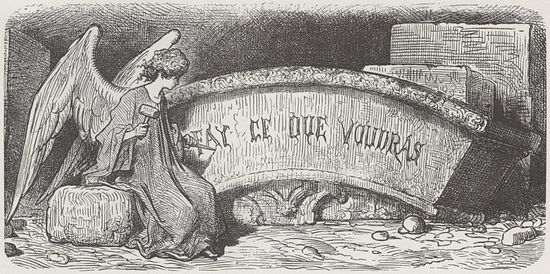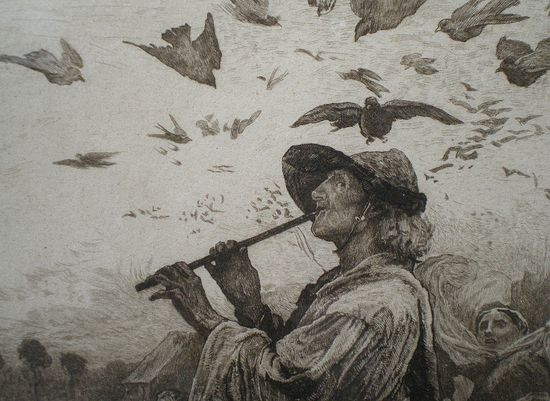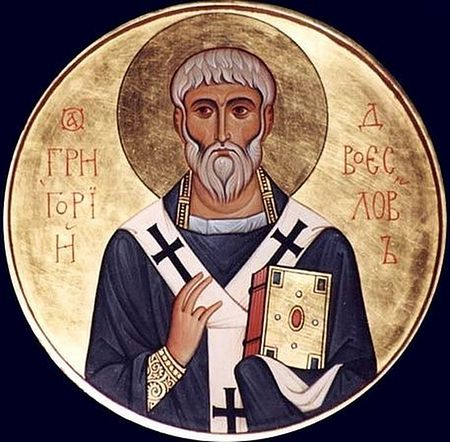 The Pied Piper of Hamelin
The Pied Piper of HamelinPosted on 10/31/2015 5:32:20 PM PDT by NRx
 The Pied Piper of Hamelin
The Pied Piper of Hamelin
Not long ago on Facebook an argument broke out about what is at first glance an innocent object—namely, an apple. After my operation I was unable to move around, and I decided to spend the wealth that had suddenly fallen into my lap—free time—on a Facebook discussion. This was on the eve of the feast of the Transfiguration, and I and two other priests were arguing on the theme of whether or not this fruit can be eaten before it has been blessed by the Church on the feast day poetically called by our folk, “The Savior of the Apples.†Internet battles are almost always accompanied by heated arguments. This one was no exception. The truth didn’t really come out during the discussion, but some very relevant problems of modern pastoral work were delineated, and I would like to talk about them here.
To put it briefly, the essence of the argument was that the fathers, motivated by love for their flock, allowed them to taste the fruit (early apples and grapes)[1] before the feast of the Transfiguration, while I insisted on the ban, emphasizing its meaning: the remembrance of our forefather’s sin, and especially stressing the sanctions that come from violating the commandment. As a result, one particularly “loving†father (incidentally, he is currently suspended from the priesthood) accused me of misanthropy. I will cite an especially colorful fragment of his “accusatory speechâ€: “My spiritual father over our twenty-five-year-long relationship never once said a single judgmental word to me, never mind ‘punishment’. He explained to me that the one who stands behind the flock with the whip is a shepherd, but the one who stands ahead of them with the pipe is a pastor. You are apparently just an ordinary shepherd who doesn’t know how to love children or your flock, and that’s why you are trying to justify your sadistic inclinations.â€
That is the conversation that came out in the social network, and everyone left it without giving up their own opinions. What irked me was their obsession with “Loveâ€. If it were possible to make the first letter, already capitalized, even larger, then this preacher’s passion would have required an at least 100 point typeface. Love without rules is, in my view, the most exact way to describe this phenomenon. We habitually, even with a kind of gratification, berate the Western values system that has been “enriched†recently with such prizes as the legalization of same-sex marriages, juvenile law, the replacement of mama and papa with parent no. 1 and no. 2, and on the horizon are most likely legalized incest and pedophilia. The army of Love is confidently marching over the taboos standing unshakably on mankind’s path, upheld by the stilts of this exalted to the heavens “Lâ€. It is the logical apotheosis of Western European humanism. But they are understandable: the consumer society, eudaemonistic culture, epicurean, Dionysian, sybaritic, and… let those who enjoy rebuking call it what syndrome they like. But how did these same stilts grow out from under the ryassas of Orthodox priests in a supposedly conservative milieu?
With a light hand quivering from laughter, Francois Rabelais (1494-1553) outlined the humanistic ideal in his “rule†of the Abbaye de Thélème: “Do as thou wilt!†And this utopia has become a reality before our eyes not only in secular Western society but also in Western, mainly Protestant, Churches and has metastasized throughout the world. This even includes part of our Eastern Orthodox Church.
 Motto of Thйlиme Abbey: “Do as thou wilt!†Drawing by Gustave Dore.
Motto of Thйlиme Abbey: “Do as thou wilt!†Drawing by Gustave Dore.
To make the picture clear I will cite a description of this most progressive abbey.
“In the Abbey of Thélème there are no walls surrounding it, no schedules, and it accepts only ‘those men and women who are distinguished by their beauty, stateliness, and courteousness.’ Women are forbidden to flee the society of males, and the abbey can be left at any time. Instead of the vows of chastity, poverty, and obedience its inhabitants ‘are obliged to proclaim that each has a right to match in lawful manner, be rich, and enjoy full freedom.’ And in general, the only rule the abbey espouses is, ‘Do as thou wilt!’ The abbey has a name that comes from the Greek word, θÎλημα, which means ‘will, desire.’
“The abbey and its inhabitants represent a genuine utopic ideal. The luxurious abbey has ‘9332 living rooms, each one having its own bathroom, office, cloakroom, and prayer room…’â€[2]
Curiously, Rabelais[3] was one of the favorite authors of the famous English occultist and satanist Alister Crowley (1875-1947). Crowley even called his villa in Sicily the “Telema Abbeyâ€, where he and a few followers gave themselves over to monstrous occult and tantric practices.
Rabelais’s ideas were reflected in the main principles of Crowley’s teaching, which he summed up in a few words:
So that shows the evolution from humanism to satanism. The two legs of this monster walking around the planet are: Love and Will. Love without rules and your own will. We pray to God: “Hallowed in Love be Thy name! Thy Kingdom of Righteousness come! Thy holy will be done!â€
The example one of these fathers gave in the heat of the argument is quite telling: a shepherd walks behind with his whip while the pastor walks ahead with his pipe. The first, in the author’s mind, is hatred incarnate, while the second is the personification of love. The pastoral image of the shepherd with a pipe is a favorite scene from the Renaissance. Anyone who has even once seen how a shepherd herds his flock can confirm that he walks behind the sheep and attentively watches that nothing happens to them. If even one sheep slides off a tall mountain slope the shepherd patiently searches it out and lifts it up, binds its wounds, takes it on his shoulders and carries it. If wolves come near he calls the sheep and drives the wolves away, risking his own life. This is the example that Christ gives, painting a picture of the Good Shepherd. This is true pastoral love—not with a pipe, his back to the sheep, but caring, much laboring, without sleep or rest, outwardly unattractive, sweaty, covered with dust and dirt, but so dear and close to the immortal human soul that you can’t confuse his voice with anything else.
Another character comes to my mind who also likes to play the pipe and head processions—the Pied Piper, who led the children out of the Hamelin.
 The Pied Piper of Hamelin. Fragment of an engraving produced from the painting by George Pinwell.
The Pied Piper of Hamelin. Fragment of an engraving produced from the painting by George Pinwell.
Many Protestant Churches have played the pipe to such a point that they now marry same sex couples, allow women to become priests, and rent out their empty churches to nightclubs, bars, and health clubs. The flock is tired of listening to the pipe; they want some other form of entertainment, because they have never been taught any true spiritual work.
Humanism, which foamed up in Europe on the wave of the Renaissance, played an evil joke on it. The exchange of the theocentric consciousness of medieval man for an anthropocentric one was a true catastrophe. This anthropological revolution, which preceded everything that came after it, was made possible in Catholic society due to one mistake in the dogmatic teaching of the Roman Catholic Church, which states that with the fall, man’s nature did change—only his relationship with God was ruined. This “not seeing†sin in human nature, which migrated from Catholicism to Protestantism, in a risky, thrilling struggle for the rights of man led finally to the legalization and defense of sin itself.
As opposed to Western European humanism the humanism of the Eastern Church is built on the principles of Orthodox teaching: from the moment of our first parents’ fall, the nature itself of the first Adam and his descendants was profoundly damaged. But we must love man, even in his fallen state, while we must hate the sin that has nested in his nature. This love through suffering is the love of the cross. It reaches its perfection by passing through the furnace of fiery temptations, becoming courageous and fearless. Though it be covered with curses, contempt, mockery, and threats, it is nevertheless unafraid of pronouncing a resolute “no†to the gendarme of liberal values. It’s honor is praised by the Apostle Paul in his hymn (cf. 1 Cor. 13), it strives toward eternity—it never faileth: but whether there be prophecies, they shall fail; whether there be tongues, they shall cease; whether there be knowledge, it shall vanish away (1 Cor. 13:8). Only it restrains the world subject to the law of entropy from total collapse. It is the salt of the earth (Mt. 5:13). And it preserves its qualities only in the light of the true faith. The moment the faith dies out, the salt loses its strength and becomes good for nothing.
Their distortion of the dogmatic teaching sank the Catholic and Protestant Churches into the darkness of carnal mindedness, from which in the final analysis will come the “man of sinâ€, the “son of perditionâ€â€”the antichrist. He will be the incarnation of illicit love and the deification of self-will. His forerunner and servants have put much effort into preparing mankind for accepting the “messiahâ€, whose proud lips, filled with lies, will pronounce blasphemy against the truth. It is he who blithely plays the pipe and leads a mankind zombified by illicit love into the abyss of eternal perdition.
And what do the holy fathers write for the edification of pastors? When you turn to our patristic inheritance you never cease to be amazed at how the instruction of our Church’s teachers to their contemporaries applies so precisely to our times also.
In his book, On the Duties of the Clergy, St. Ambrose of Milan places at the foundation of honorable priestly service the following four virtues: wisdom, justice, courage, and temperance. A servant of the Lord should not be enticed by earthly pleasures; he should manifest all the moral qualities that the Apostle Paul requires of him[5] (see 1 Tim. 3).[6]
Basing their teaching on the words of the Apostle Paul to “be all things to all menâ€, the holy fathers paid particular attention to the various pastoral approaches in the work of saving souls. St. John Chrysostom wrote that a pastor should be important and not proud, stern and propitious, authoritative and at the same time sociable, dispassionate and obliging, humble and not man-pleasing, strict and merciful.[7] “What testimony do we need,†says St. Gregory the Theologian, “in order to correct a manner of life and subject dust to the spirit, for there are different inclinations and understandings with men and with women, with the old and the young, those in authority and those in submission… some are taught by a word, others by example, some need a whip, while others need a bit… one must be angered without being angry; have contempt without being contemptuous; lose hope without despairing; heal some with meekness, others with humility, and yet others with rebukes, and so on.â€[8]
 St. Gregory the Dialogist.
St. Gregory the Dialogist.
St. Gregory the Dialogist goes into more detail about the different methods of healing infirmities in his Pastoral Rule—a special work dedicated to the problems of pastors. St. Gregory shows himself to be a subtle psychologist and experienced instructor when he teaches that a priest is allowed at times to condescend to his flock’s lesser vices in order to remove the greater ones:
“It often happens also that the soul is wounded by the infirmity of two vices, one of which acts less, the other more strongly. In such cases it is wiser to give speedier help against the vice that is more dangerous and more quickly leads to perdition. And if the soul cannot be saved from imminent death in any other way than by increasing the opposite vice, then the preacher in his teaching, acting with wise discernment, can allow the increase of one, in order to save from imminent death the one who is threatened by the other. In acting this way, he does not increase the illness but meanwhile saves the life of the sick one he is doctoring, waiting for a convenient time to effect total recovery to health. Thus, we see no few examples of the fact that many have been drawn into unrestraint in satiating themselves with various lures of food and drink, almost ready to give themselves over entirely to the enticement of the passions overcoming them; but when from fear in the struggle they make an effort to restrain themselves within the boundaries of temperance, then they are given over to the temptation of vainglory. In such people one vice can in no way be completely destroyed if we do not allow an overbalance in food for the other, so that one as if squeezes and casts out the other. What wound should be hounded more energetically if not the one that causes danger? Thus, we can allow sometimes that through the virtue of restraint arrogance might increase in a person, if only luxury might not destroy his decidedly intemperate life… allowing the lesser destroys the greater, in order that not yet having grown to that measure of perfection, in order to destroy all the evil in oneself, one might remain for the time being with the lesser fault, to at least be delivered from the greater vice (Chap. 40).[9]
The modern Christian would judge differently: “It would be better for me to eat everything and be humble but love everyone, than to fast strictly and think myself better than everyone.†However, St. Gregory sees a greater danger in love of luxury than in the vainglory that accompanies temperance.
Another holy father of the Western Church, blessed Jerome of Stridon, councils the pastor never to eat to satiety, but to the contrary, forget sometimes about lunch, or at least about dinner. And about drinking wine he says outright, “Remember, Lot was not conquered by Sodom but by wine.â€[10]
And of course, at the cornerstone of priestly service the teachers of the Church place compassionate pastoral love. In a textbook on pastoral theology for candidates to the priesthood it is said that a pastor of rational sheep “must take all measures to cultivate in his heart this most exalted and eternal good—holy love for people and for the higher world. Without this quality he cannot be a pastor. A pastor without love is like the body without the soul, a flower without color, a morning without the dawn, a day without the radiant sun, or, according to the apostle, an extinguished star, wandering in the darkness of night (see Jude 1:13).
If we talk about the measure of fervency of pastoral love we briefly note that pastoral love increases with the pastor’s self-denial, the bearing of his flock’s sorrows, the continual struggle with his own self-love, with fiery prayer and unremittingly forcing himself towards works of piety.â€[11]
In all of the above patristic sayings on pastoral service resounds the thought that this is the highest art there is—not playing the pipe, but many years of hard work combined with self-denial and forcing of oneself to acquire the gift of active, compassionate love, which does not smear over festering wounds with greasepaint, but patiently doctors them, pouring on them oil and wine—love and sternness.
In conclusion I would like to address our father-pastors of rational sheep: do not be afraid to be stern, first of all with yourselves. Love of neighbor can become compassionate only through suffering. Any other love is simply playing the pipe; playing without rules.
01 / 11 / 2015
[1] It is a tradition in the Orthodox Church to abstain from newly harvested fruits—in Greece, grapes, in Russia, apples—before they have been blessed in church on the feast of the Transfiguration. This doesn’t mean that last year’s fruits cannot be eaten.
[2] An article on the webite CULTIN: http://www.cultin.ru/books-telemskoe-abbatstvo.
[3] Interestingly and to the point, while in Rabelais’s time his works were frowned upon by the Catholic Church and in the early twentieth century he was called a militant anti-Christian atheist, he is now described by scholars as a Christian humanist (https://en.wikipedia.org/wiki/Fran%C3%A7ois_Rabelais).—O.C.
[4] Article in Wikipedia: http://library.kiwix.org/wikipedia_ru_all_09_2013/A/Телема.html
[5] St. Ambrose of Milan, On the Duties. Kiev 1895, 69.
[6] Blameless, the husband of one wife, vigilant, sober, of good behaviour, given to hospitality, apt to teach; not given to wine, no striker, not greedy of filthy lucre; but patient, not a brawler, not covetous; one that ruleth well his own house, having his children in subjection with all gravity (and the rest of Tim. 3).—O.C.
[7] St. John Chrysostom, Works, vol. 1 (St. Petersburg, 1895), 431.
[8] St. Gregory the Theologian, Works, vol. 1 (Moscow, 1889), 33-35.
[9] St. Gregory the Dialogist, Pastoral Rule (Kiev, 1894), 2:136. (Having looked at an English translation of this work only eleven chapters were found, and this citation was not found. The above is a translation from the Russian cited above.—Trans.)
[10] Works of the Holy Fathers of the Western Church (Kiev, 1894)2:136.
[11] http://bookitut.ru/Pastyrskoe-bogoslovie-t-1.html
In Africa, they love until the mother pinches off yet another mouth to feed. Then they spread their love to the next mother. And on, and on...
Before you know it, there are 2 billion more in poverty and despair.

Good thing we’ve been assured that Catholics never post Protestant hit pieces or someone might be tempted to think this is one.
“Good thing we’ve been assured that Catholics never post Protestant hit pieces or someone might be tempted to think this is one.”
Since neither I, nor the author are Catholics you would be mistaken.
But which is an abuse of the term "Protestant," which would be akin to calling Santeria "Catholic."
Show me one "Protestant" church that does such while strongly believing in Scripture as being the supreme authority as literally being the wholly inspired wholly accurate Word of God, and upholds other core distinctives of the Reformation.
Instead, it is those who hold most strongly to the authority of Scripture as the wholly inspired wholly accurate Word of God who are by far the most conservative, including in opposition to sodomy, in contrast to the overall fruit of Catholicism .
The author fails to know or mention such things as that,
A 2002 nationwide poll of 1,854 priests in the United States and Puerto Rico reported that 30% of Roman Catholic priests described themselves as Liberal, 28% as Conservative, and 37% as Moderate in their Religious ideology. A combined 15 percent of the clergy polled identified themselves as "gay (9%) > or more (6%) on the homosexual side." Among younger priests 23 percent did so. Los Angeles Times (extensive) nationwide survey (2002). http://www.bishop-accountability.org/resources/resource-files/reports/LAT-Priest-Survey.pdf
17 percent of the priests said "definitely" , and 27% said "probably," a homosexual subculture'--defined as a `definite group of persons that has its own friendships, social gatherings and vocabulary'--exists in their diocese or religious order. ^
After examining the official web sites of 244 Catholic universities and colleges in America, the TFP Student Action found that 107 – or 43% have pro-homosexual clubs. TFP Student Action Dec. 6. 2011; studentaction.org/get-involved/online-petitions/pro-homosexual-clubs-at-107-catholic-colleges/print.html
39 percent of Roman Catholics and 79 percent of born-again, evangelical or fundamentalist American Christians affirm that homosexual behavior is sinful. LifeWay (SBC) Research study, released Wednesday. 2008 LifeWay Research study. http://www.christianpost.com/article/20080606/survey-americans-divided-on-homosexuality-as-sin.htm
And then show me one NT church which ordained men as priests, prayed to saints, preached purgatorial suffering commencing at death in order to atone for sins and become good enough to be with God, looked to Peter as the first of a line of infallible popes (well, as Orthodox at least you reject the last two), among many other novelties .
No, there is no hijack, for you choose to post an broad attack on Catholic and Protestant Churches, mainly the latter, thus inviting reproof of the article.
Their [Renaissance humanism] distortion of the dogmatic teaching sank the Catholic and Protestant Churches into the darkness of carnal mindedness,
Which evangelicalism rose to combat, and while the term, as with all distinguishing terms originating out of need, is watered down today, as a group they are yet the most conservative overall.
Actually, the Orthodox sometimes use to the term "Catholic" to describe themselves, if not "Roman Catholic."
And as your article testifies, there are contentions btwn the two.
So say you now.
But here, you say different.
"Slight correction to my previous. I am Catholic in the context of the Nicene Creed. Just not Roman."
Hence I am correct and you are exposed.
You are Catholic by your own admission, and this is just another Protestant hit piece.
 St. Gregory displaying The Shocker.
St. Gregory displaying The Shocker.
Really, I'm sick of that type of repetitious nonsense, wherein some Catholic or another (this time, one who self-identifies as 'Orthodox') brings an article from an unofficial source that makes some combination of the same mistaken assumptions which have been shown previously to be erroneous.
Over and over, it's like every day one must re-invent the wheel, taking care to be exacting, if bothering enough to seriously address the assertions and prognosis being proffered --- yet still have that ignored, or be somehow personally attacked for bothering with all the effort that it takes to carefully read, then adequately respond.
NRx --- is there ANYTHING new here?
These type of articles often come across as form of brainwashing/programming technique.
Does FreeRepublic NEED this article?
Could you sum up why you may think so, if you do?
How would you like it if I told you to limit it to three paragraphs or less, as one of the cheap-shot FRomans attempts to limit myself to?
Would that be fair?
Personally, I think not, yet that is what I'm often handed, if not abused in some other way, or else totally ignored. Yet I'm supposed to take everyone else serious, and be always polite in return.
Whatever the problems are with Western philosophy (and there can be plenty there which stands to be criticized, even pointed towards as part of primary cause for the godlessness of humanist philosophy) blaming it all on 'Protestants' doesn't fly, but instead indicates shallow understanding of the guiding principles of actual practicing Christians, who are not either Latin Church Catholic or else some flavor of Orthodox, while ignoring the centuries of gains made and shared with the rest of the world by those same type of Christians who in this article which you bring, if my quick scan of that is accurate, are being blamed for philosophical outlooks which they may not share, but instead in significant numbers, do oppose.
I looked again at the thought processes and reasoning within the article. It's a lot like blaming the criminality of criminals on the law-abiding.
The Catholics have a handful of one size fits all argument for when serious failings can pointed towards extant within membership of Catholicism. They say "Catholic in name only", or that it was just some prelate or lesser individual with a limited opinion.
Yet when the likes of the now feminist/humanist ECUSA is looked at, what is being ignored is that they have already drastically shrunk, and are but echoes of godless humanistic philosophy which arose not from within Protestant Churches, but were corruptions of what was taught within those. When the likes of ECUSA acknowledges the Lord much at all (as they must, in order to keep up appearances) they relegate Him to some distant role, stripped of His Holiness, having only 'mercy towards sinners' which is transformed by the humanists into being as good as ratification for themselves not needing learn of & know of that same capital "H" Holiness.
Those who rely upon the milk of the word only, are unskilled in the Word, as the Apostle Paul did reveal. Those who use a substitute milk, not of God, but more of their own making, are simply frauds.
Many can see this, and have already, without lecture from some Catholic or Orthodox telling them in effect that it is because of their own failure to bow down before Latin Church prelates, or else join in with some Orthodox sect or another, that is the cause of the collapsing of standards of morality within the so-called "Western" world.
So again, I must ask --- what is that is 'new' in this latest article which you have brought here to post on FR.
Just what? Can you single it out? 3 paragraphs?
I can see why you say the roman catholic church has problems with this guys thinking....not that it is all wrong, but has real problems.
...so...if I am clinging to two sinful ways, it is ok to increase the lesser while i stomp out the worser. Catholics would say this is wrong. They both worship satan and work on one at a time may focus all energies toward success overall, perhaps, but no excuse for sinning more in anything.
I will beat my wife more when i get sexual urges for my son, hence i will first overcome the one terrible way first as my wife can handle more beatings for now, she’ll heal ok later. Then i will work on my anger toward her and necome more holy. Rubbish.
Addicted to drugs, alcohol, adultery, eating....stop all the son, or slow most and focus on the worst for your spul. Not increase drugs while you learn to forget and leave your mistress.
Words mean things.
“No, there is no hijack, for you choose to post an broad attack on Catholic and Protestant Churches, mainly the latter, thus inviting reproof of the article.”
You should really look at the comment I was responding to. It has nothing at all to do with the subject of this thread.
When the term Catholic is used with the capital ‘C’ it is generally understood to refer to those Christians in communion with the Pope of Rome. That’s pretty commonly understood. If you are going to get involved in serious discussions this is something that you ought to know.
You should really look at the comment I was responding to. It has nothing at all to do with the subject of this thread.
I see: i assumed you were anticipating Protestant protests, sorry. It seems to me like the poster has the wrong thread, rather than trying to hijack it.
That's not an opinion commonly held by the Roman Catholic contingent. They include the Orthodox as Catholic capital *C*.
So, take it up with them.
You are Catholic. You posted a Prot hit piece. My comment stands.
Only those in the 23 Eastern Churches. Those not in communion with the pope (the author and OP, for example) aren't called "Catholic" under most circumstances, if ever.
But here's a fun fact -- the Orthodox are still properly called "the Orthodox Church" and have valid sacraments. No other non-Catholic assembly qualifies as a Church or possess the sacraments.
No matter what kind of orthographic games you play, the Orthodox are not in communion with Rome, nor is Rome in communion with them.
If you bother to read the original posting (and can figure out what it's saying with the UTF-8 or whatever those strange characters are supposed to be), it's basically taking the usual Orthodox tack of slamming Rome and Protestants together as two peas in the same pod.
Disclaimer: Opinions posted on Free Republic are those of the individual posters and do not necessarily represent the opinion of Free Republic or its management. All materials posted herein are protected by copyright law and the exemption for fair use of copyrighted works.